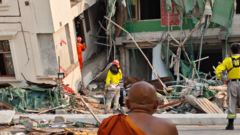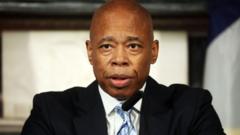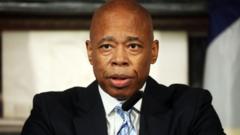The case highlights ongoing tensions between immigration policy and judicial authority as the Trump administration argues against a lower court's mandate.
**Supreme Court Delays Deportation Ruling for Salvadoran Man Amid Administration Dispute**

**Supreme Court Delays Deportation Ruling for Salvadoran Man Amid Administration Dispute**
Supreme Court's temporary decision provides leeway for further deliberation on the deportation case of Kilmar Abrego Garcia.
In a significant turn of events, the US Supreme Court has granted an emergency stay on the deportation ruling for Kilmar Abrego Garcia, a Salvadoran man said to have been wrongly deported. Chief Justice John Roberts approved the Trump administration's request to pause the lower court's recent order, which mandated Garcia's return from El Salvador by the impending deadline of midnight on Monday.
Garcia's deportation on March 15 was described by the government as resulting from an "administrative error"; however, authorities allege he is linked to the MS-13 gang—a claim his legal team disputes vehemently. In an emergency appeal, the administration contested the authority of the Maryland judge who issued the reversal, asserting that the US does not hold the power to enforce its directives on El Salvador.
US Solicitor General D John Sauer emphasized in court documents that the sovereignty of El Salvador must be respected and that only the president oversees matters of foreign diplomacy, which includes decisions related to the removal of foreign nationals.
The Supreme Court's intervening stay allows for further consideration of the case, with Garcia currently held at a maximum-security facility in El Salvador. His US citizen wife, Jennifer Vasquez Sura, has publicly advocated for his release, revealing that Garcia, a sheet metal worker, was captured during a previous law enforcement initiative.
Garcia entered the US illegally as a teenager and was previously able to avoid deportation due to fears of gang violence directed at him back home. In 2019, immigration judges had determined he faced potential persecution, granting him protective status. Following his recent deportation, his legal counsel compared the situation to a "forcible expulsion," criticizing the actions of the Trump administration.
In a hearing last week, Judge Paula Xinis, a Barack Obama appointee, expressed incredulity over the government's actions, stating they were devoid of legal authority and presented a shocking violation of human rights. The government’s legal missteps led to the suspension of a key attorney involved in the case, highlighting the administration's internal conflict over immigration enforcement.
As the Supreme Court weighs its options, Garcia's future remains uncertain, but his team is hopeful for a swift resolution to rectify the perceived injustice of his deportation.
Garcia's deportation on March 15 was described by the government as resulting from an "administrative error"; however, authorities allege he is linked to the MS-13 gang—a claim his legal team disputes vehemently. In an emergency appeal, the administration contested the authority of the Maryland judge who issued the reversal, asserting that the US does not hold the power to enforce its directives on El Salvador.
US Solicitor General D John Sauer emphasized in court documents that the sovereignty of El Salvador must be respected and that only the president oversees matters of foreign diplomacy, which includes decisions related to the removal of foreign nationals.
The Supreme Court's intervening stay allows for further consideration of the case, with Garcia currently held at a maximum-security facility in El Salvador. His US citizen wife, Jennifer Vasquez Sura, has publicly advocated for his release, revealing that Garcia, a sheet metal worker, was captured during a previous law enforcement initiative.
Garcia entered the US illegally as a teenager and was previously able to avoid deportation due to fears of gang violence directed at him back home. In 2019, immigration judges had determined he faced potential persecution, granting him protective status. Following his recent deportation, his legal counsel compared the situation to a "forcible expulsion," criticizing the actions of the Trump administration.
In a hearing last week, Judge Paula Xinis, a Barack Obama appointee, expressed incredulity over the government's actions, stating they were devoid of legal authority and presented a shocking violation of human rights. The government’s legal missteps led to the suspension of a key attorney involved in the case, highlighting the administration's internal conflict over immigration enforcement.
As the Supreme Court weighs its options, Garcia's future remains uncertain, but his team is hopeful for a swift resolution to rectify the perceived injustice of his deportation.





















